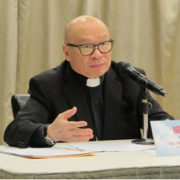
In recent days the Archbishop of Canterbury Justin Welby has made two interventions that have stirred the waters of public interest. First, he criticised the British Government’s proposal to reduce overseas aid from 0,7% to 0,5% of GDP (PIL in italiano).
Second, Welby announced that he will be taking a three-month sabbatical for «reflection, prayer, and spiritual renewal» in May 2021. Strikingly, more attention and speculation has surrounded this second and more personal intervention than his vocal criticism of foreign aid cuts. This article questions why there is such debate around Welby’s sabbatical and considers the wider implications.
Here is the Tweet announcing the Archbishop’s decision, which has provoked such a mixed response. As the Tweet shows, his sabbatical is presented as a specific time for spiritual renewal that finds justification in Scripture and in the Church of England’s historical practice. Ordained members of the Church of England might apply for sabbatical every 7 to 10 years. Perhaps the final line is most revealing of intent: that «no minister is indispensable to the work of God».
Framing his decision in this theological lens attempts to signal that the work of God continues, even if leadership is lived out differently. It is not as though the Church of England will be without the Archbishop of Canterbury, it is just that the Archbishop of Canterbury will be leading in another way by committing to religious retreat as a form of public duty. This is a subtlety that is overlooked.
After all, Welby is not the first Archbishop of Canterbury to take a leave of absence from public ministry. His predecessor Rowan Williams also had a three-month period where he withdrew from public office in 2007 to continue research and produce a book. Noticeably, Williams was following a tradition within academia whereby professors would be freed from teaching and administrative responsibilities to facilitate their study and publication projects.
Yet, sabbaticals in 2007 are not the same as sabbaticals in 2021. Deciding to enter a sabbatical when the fall-out of Covid-19 is still unclear raises eyebrows. As one Daily Telegraph respondent remarks «I thought the Archbishop had already been on a sabbatical, judging by his absence during this pandemic». Tim Stanley, similarly, makes the case for a much-needed public presence rather than absence as the world grapples with the Coronavirus pandemic.
«This should be the Church’s big moment because the central message of Christianity is that while death is bad – and we will accompany you through it – it’s not the end. Jesus lived. He died. He rose again…But there is no accompaniment in 2020 because the churches have been shut (earlier this year, the Anglicans banned even their own clerics from entering them), and though the Church of England hierarchy spreads the Good News, it tends to do so quietly and thinly.»
Such criticisms, though, overlook the continual call by the Church of England and Archbishop Welby in caring for the vulnerable and poorest in our societies. Welby has been very much present in the national conversation. While all institutions and public bodies are now trying to manage the continually changing Covid measures, Welby offers a powerful sign of the need to take time for serious reflection: to respond to the pandemic in an existential as well as practical manner.
2020, to a certain extent, has been experienced as a collective form of sabbatical with our lives turned upside down. We have globally been compelled to reflect on the way we live. We need only think of the way we have grown accustomed to a home office rather than working in shared offices.
Thomas Gernon in Science magazine shares how a break from duties, with a change in environment, helped him to reboot his thinking, explaining that «if you hit a dead end» a sabbatical can help you to «shift gears and move in a new direction». If, culturally, we have «hit a dead end», perhaps Welby’s example offers wider society an opportunity to press the reset button.
Speaking in September 2020 Pope Francis stated that the pandemic has in «some ways, given us a chance to develop new ways of living». Welby, too, is investing time in listening and discernment. In what ways can we respond in a sabbath-like way?





